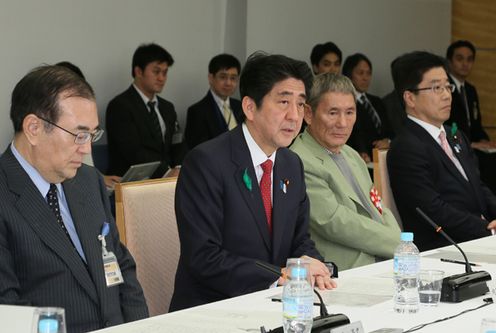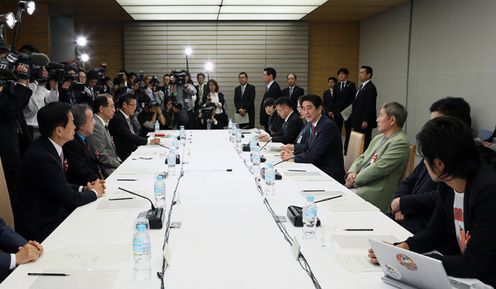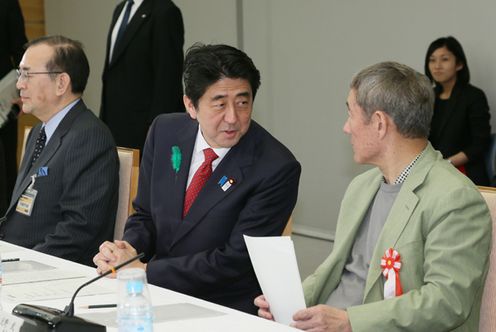Home > News > The Prime Minister in Action > April 2013 > Advisory Committee on Cultural Exchanges in Asia
Advisory Committee on Cultural Exchanges in Asia
Friday, April 19, 2013

Photograph of the Prime Minister delivering an address at the meeting of the Advisory Committee on Cultural Exchanges in Asia 1

Photograph of the Prime Minister delivering an address at the meeting of the Advisory Committee on Cultural Exchanges in Asia 2

Photograph of the Advisory Committee on Cultural Exchanges in Asia
Prime Minister Shinzo Abe attended a meeting of the Advisory Committee on Cultural Exchanges in Asia at the Prime Minister's Office.
At the meeting, after the Chair was appointed, an open debate took place.
The Prime Minister said in his opening address,
"In preparation for the Japan-ASEAN Summit Meeting in December to commemorate the 40th anniversary of Japan-ASEAN relations, this experts' meeting was convened to benefit from your wisdom to realize the 'creation of a new Asian culture' - one of the pillars of the Abe administration's new Asia policy.
East Asia, broadly defined to include India and Australia, is becoming a core of the world in the 21st century. Asian culture has the longest history in the world and, indeed, has a rich diversity. Vietnam and countries to the north of it are where Chinese texts were cultivated, and Confucian and Mahayana Buddhism traditions were fostered. To the south is where Hinduism, Islam, and Theravada Buddhism were strongly rooted due to the strong influence of the civilizations of the Indosphere. In Oceania, you have Australia and New Zealand which possess the traditions of Christian and European civilization.
Since ancient times, the civilizations using Chinese characters and the civilizations of the Indosphere were long separated by the massive Himalayan mountain ranges. Today, however, the Pacific Ocean and the Indian Ocean are linked together, forming a giant canal that vast quantities of people, goods, money, and information flow through. In the latter half of the 20th century, many Asian countries gained independence. Later, Asian countries achieved eye-opening economic growth, and a middle class emerged in many countries. And at the end of the 20th century, many countries achieved democratization. The diverse civilizations of Asia are now moving significantly towards the establishment of one integrated civilization while retaining their infinitely beautiful diversity. I am sure that the Trans-Pacific Partnership (TPP), which links the Pacific Rim, the Regional Comprehensive Economic Partnership (RCEP), which promotes East Asian integration, and the Japan-China-ROK economic partnership agreement (EPA) will serve as catalysts to this end.
The new Asian civilization must be discussed under the theme of 'Fusion and Harmony.' Modernization and industrialization are similar to the growth of children. In the case of humans, there is a large gap between an elementary school student and a university student but a minimal gap between a 40-year old and a 50-year old. Having achieved remarkable growth, what kind of an East Asian civilization will the diverse range of Asian countries establish through an inclusive process? What kind of a contribution can Japan make? And, conversely, what benefits can we expect to receive?
In all of Asia, since ancient times we have held the values of respecting people, overcoming conflicts with tolerance, caring for the weak, and living in solidarity. I am convinced that Asia in the 21st century will establish a new form of human civilization. I would like to ask for your assistance in creating this new Asian civilization."


